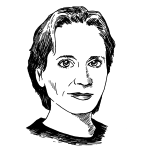Lydia Davis was born in 1947 to a fiction writer and a book critic. In first grade she learned to read English. In second grade (in Austria) she learned to read German. Her books include a novel, The End of the Story (1995), four full-length story collections—Varieties of Disturbance (2007), Samuel Johnson Is Indignant (2002), Almost No Memory (1997), and Break It Down (1986)—and several small-press and limited-edition volumes.
Her writing defies generic classification. Some of her fiction could just as easily be called essay or poetry. Many of her stories are extremely short. Her narrators are often given a drastically narrow scope but an extremely sharp focus. Their observations might be described as dispassionate—sometimes humorously so—and for this reason the considerable emotional component of Davis’s stories is often subtextual.
You have reached your article limit
Sign up for a digital subscription and continue reading all new issues, plus our entire archives, for just $1.50/month.
Already a subscriber? Sign in





